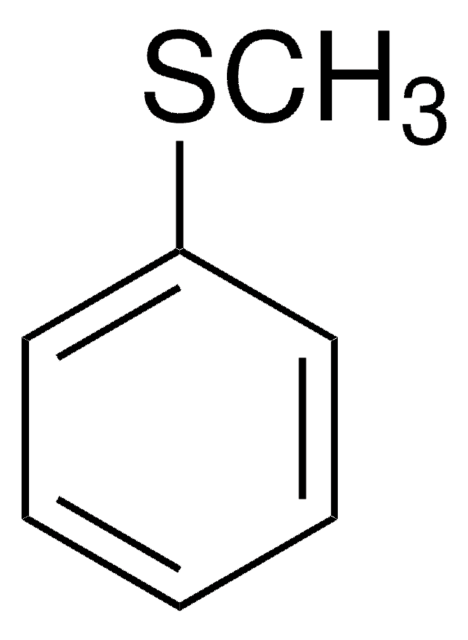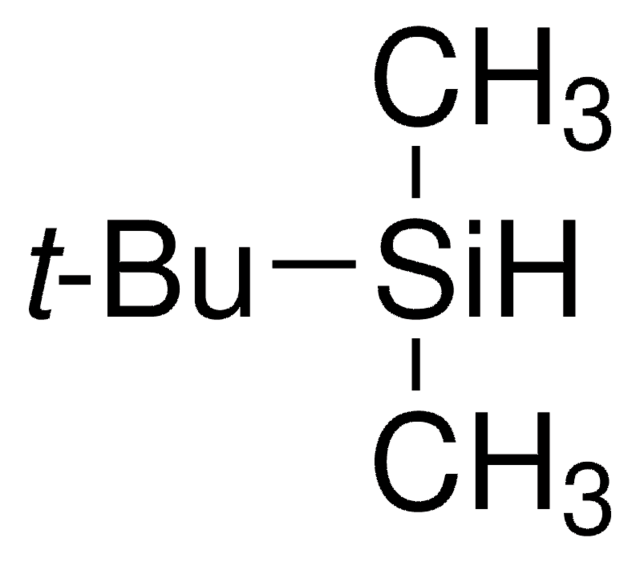233781
Triisopropylsilane
98%
Synonym(s):
TIS, Triisopropylhydrosilane, Tris(1-methylethyl)silane
Sign Into View Organizational & Contract Pricing
All Photos(1)
About This Item
Linear Formula:
[(CH3)2CH]3SiH
CAS Number:
Molecular Weight:
158.36
Beilstein:
1733718
MDL number:
UNSPSC Code:
12352103
PubChem Substance ID:
EC Index Number:
464-880-1
NACRES:
NA.22
Recommended Products
Quality Level
Assay
98%
form
liquid
reaction suitability
reagent type: reductant
refractive index
n20/D 1.434 (lit.)
bp
84-86 °C/35 mmHg (lit.)
density
0.773 g/mL at 25 °C (lit.)
SMILES string
CC(C)[SiH](C(C)C)C(C)C
InChI
1S/C9H22Si/c1-7(2)10(8(3)4)9(5)6/h7-10H,1-6H3
InChI key
YDJXDYKQMRNUSA-UHFFFAOYSA-N
Looking for similar products? Visit Product Comparison Guide
Related Categories
General description
Triisopropylsilane (TIPS) is an organosilicon compound used as a reducing agent in organic synthesis due to its relatively low toxicity, ease of handling, and its ability to selectively reduce various functional groups. It is used in the presence of a Lewis acid such as titanium (IV) chloride to selectively reduce ketones and aldehydes to their corresponding alkanes and selective reduction of epoxides to the corresponding alcohols.
Application
Triisopropylsilane can be used as a reducing agent:
- To synthesize 4-pyrrole phenylacyl peptide during solid-phase peptide synthesis.
- In transition metal complex-catalyzed reaction of amides with hydrosilanes.
- For the selective reduction of C-arylglucosides into β-C-aryl glucosides.
- To facilitate the cleavage of acetamidomethyl (Acm), 4-methoxybenzyl (Mob), and tert-butyl (But) protecting groups from cysteine (Cys) residues in the presence of trifluoroacetic acid.
- For the reduction of amides to corresponding amines in the presence of transition-metal catalysts.
related product
Product No.
Description
Pricing
Signal Word
Warning
Hazard Statements
Precautionary Statements
Hazard Classifications
Flam. Liq. 3
Storage Class Code
3 - Flammable liquids
WGK
WGK 3
Flash Point(F)
100.4 °F - closed cup
Flash Point(C)
38 °C - closed cup
Personal Protective Equipment
dust mask type N95 (US), Eyeshields, Gloves
Choose from one of the most recent versions:
Already Own This Product?
Find documentation for the products that you have recently purchased in the Document Library.
Customers Also Viewed
Reduction of a 4-pyrrole phenylacyl-containing peptide with trifluoroacetic acid--triisopropylsilane--phenol--H2O during solid-phase peptide synthesis and its protein kinase C $\alpha$ inhibitory activity
Hwan J and Lee
Bioorganic & medicinal chemistry letters, 15, 2271-2274 (2005)
Tetrahedron Letters, 44, 7837-7840 (2003)
Tetrahedron Asymmetry, 14, 3243-3247 (2003)
E Gibula-Tarlowska et al.
Behavioural brain research, 372, 112043-112043 (2019-06-22)
Kissorphin (KSO) is a new peptide derived from kisspeptin-10. Previous study has indicated that this peptide displays neuropeptide FF (NPFF)-like anti-opioid activity. Herein, we examined the influence of KSO (1; 3, and 10 nmol, intravenously [i.v.]), on the rewarding action of
Kanicha Sa-ei et al.
Organic letters, 8(20), 4441-4443 (2006-09-22)
The catalytic, diastereoselective coupling of alpha-silyloxy aldehydes and alkynylsilanes catalyzed by a nickel(0) N-heterocyclic carbene complex provides an effective entry to anti-1,2-diols. The scope of couplings and extent of diastereoselection are excellent across a range of substrates.
Our team of scientists has experience in all areas of research including Life Science, Material Science, Chemical Synthesis, Chromatography, Analytical and many others.
Contact Technical Service













